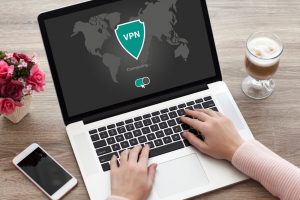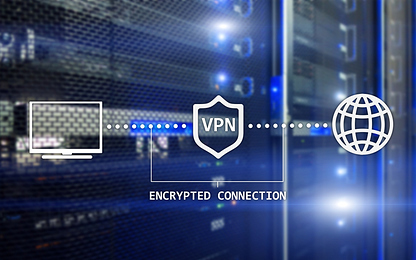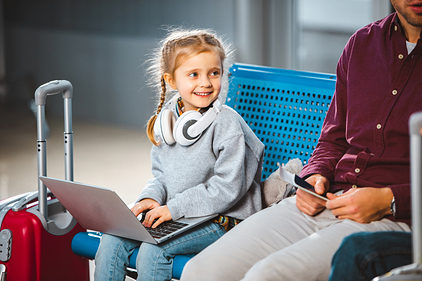
What seems like a routine, casual connection to the hospital’s Wi-Fi isn’t. Using public Wi-Fi is a daily choice loaded with risk. Sure, I’m conducting business and knocking out my to-do list like a rock star but at what cost to my security?
The Risks
By using public Wi-Fi, I’ve opened my online activity and personal data (via my laptop) up to a variety of threats including eavesdropping, malware distribution, and bitcoin mining. There’s even a chance I could have logged on to a malicious hotspot that looked like the hospital network.
Like many public Wi-Fi spots, the hospital’s network could lack encryption, which is a security measure that scrambles the information sent from my computer to the hospital’s router so other people can’t read it. Minus encryption, whatever I send over the hospital’s network could potentially be intercepted and used maliciously by cybercriminals.
Because logging on to public Wi-Fi is often a necessity — like my situation this week — security isn’t always the first thing on our minds. But over the past year, a new normal is emerging. A lot of us are thinking twice. With data breaches, privacy concerns, the increase in the market for stolen credentials, and increasingly sophisticated online scams making the headlines every day, the risks of using public Wi-Fi are front and center.
Rising Star: VPN
The solution to risky public Wi-Fi? A Virtual Private Network (VPN). A VPN allows users to securely access a private network and share data remotely through public networks. Much like a firewall protects the data on your computer, a VPN protects your online activity by encrypting your data when you connect to the internet from a remote or public location. A VPN also conceals your location, IP address, and online activity.
Using a VPN helps protect you from potential hackers using public Wi-Fi, which is one of their favorite easy-to-access security loopholes.
Who Needs a VPN?
If you (or your family members) travel and love to shop online, access your bank account, watch movies, and do everyday business via your phone or laptop, a VPN would allow you to connect safely and encrypt your data no matter where you are.
A VPN can mask, or scramble, your physical location, banking account credentials, and credit card information.
Also, if you have a family data plan you’ve likely encouraged your kids to save data by connecting to public Wi-Fi whenever possible. Using a VPN, this habit would be secured from criminal sniffers and snoopers.
A VPN allows you to connect to a proxy server that will access online sites on your behalf and enables a secure connection most anywhere you go. A VPN also allows hides your IP address and allows you to browse anonymously from any location.
How VPNs work
To use a VPN you subscribe to VPN service, download the app onto your desktop or phone, set up your account, and then log onto a VPN server to conduct your online activity privately.
If you are still logging on to public Wi-Fi, here are a few tips to keep you safe until VPNs become as popular as Wi-Fi.
Stay Safe on Public Wi-Fi
Verify your connection. Fake networks that mine your data abound. If you are logging on to Wi-Fi in a coffee shop, hotel, airport, or library, verify the exact name of the network with an employee. Also, only use Wi-Fi that requires a password to log on.
Don’t get distracted. For adults, as well as kids, it’s easy to get distracted and absorbed with our screens — this is risky when on public Wi-Fi, according to Diana Graber, author of Raising Humans in a Digital World. “Knowing how to guard their personal information online is one of the most important skills parents need to equip their young kids with today,” says Graber. “Lots of young people visit public spaces, like a local coffee shop or library, and use public Wi-Fi to do homework, for example. It’s not uncommon for them to get distracted by something else online or even tempted to buy something, without realizing their personal information (or yours!) might be at risk.”
Disable auto Wi-Fi connect. If your phone automatically joins surrounding networks, you can disable this function in your settings. Avoid linking to unknown or unrecognized networks.
Turn off Wi-Fi when done. Your computer or phone can still transmit data even when you are not using it. Be sure to disable your Wi-Fi from the network when you are finished using it.
Avoid financial transactions. If you must use public Wi-Fi, don’t conduct a sensitive transaction such as banking, shopping, or any kind of activity that requires your social security or credit card numbers or password use. Wait until you get to a secured home network to conduct personal business.
Look for the HTTPS. Fake or unsecured websites will not have the HTTPS in their address. Also, look for the little lock icon in the address bar to confirm a secure connection.
Secure your devices. Use a personal VPN as an extra layer of security against hackers and malware.
The post The Risks of Public Wi-Fi and How to Close the Security Gap appeared first on McAfee Blogs.
Article Link: https://securingtomorrow.mcafee.com/consumer/family-safety/the-risks-of-public-wi-fi-and-how-to-close-the-security-gap/


